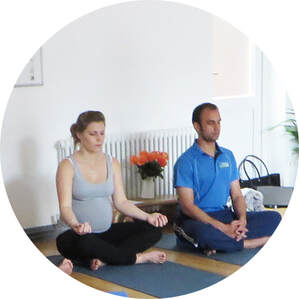 The debate is ongoing, should yoga be considered for the Olympic games? Yoga competitions have been held for over a century, and there are many yoga practitioners who would support the competitive yoga movement. But equally many of the teachings of yoga philosophy, and many of the reasons some are drawn to the practice of yoga, work away from the notion of it being competitive. Many people practice yoga precisely because you aren't in competition and it allows you space to escape from the daily struggle. You nurture the uncompetitive side of you, where you work at your own level, your own pace, challenging yourself to develop health, strength, mental and physical wellbeing and perhaps spiritual grounding and space. But there are many varied reasons for people to practice yoga, and for some it is largely athetic. The practice that most of us see in classes, on DVDs and in our home practice, is athletic. Physical exercises to stretch, strengthen, develop stamina and stability. This is the visible side of yoga, the performance of yoga postures (asana). The rest of the yoga teachings are largely invisible, not aimed at spectators. Teachings about attitudes, lifestyle, reflection, breath control, meditation. To sit cross-legged and see who can regulate the breathing well, or become realised and enlightened might not make great viewing! Yoga is different things to different people, and none of them need conflict. For some it is physical development and mastery, discipline, challenge, and these could all be aligned with developing the competitions of yoga into more formal Olympic Sport. It would be interesting to consider how the rules might differ from the rules of gymnatics. The development of yoga asana has been quite influenced by the physical culture of gymnastics so there is certainly cross over that would need to be carefully defined. The commercial side would have to be considered too. Yoga is big business, Bikram yoga has packaged and presented yoga into a neat and simple kit that has been rolled out globally and which affords him a forecourt full of Rolls Royces and diamond encrusted Rolexs. The posture sequence would surely complement his copyrighted sequence as he is in the forefront of promoting it as an Olympic Sport. So the motivation of Yoga as Sport and who governs the sport would need to be considered. There are pros and cons of course. - Making it into a mainstream sport could encourage participation which then may lead practitioners beyond the physical into the deeper teachings. Many have discovered the joy of yoga practice through the appeal of an athetic practice. - It could also work the other way, simplifying it and reducing it to a sport, losing too much along the way. I'm not a supporter of the Olympic Yoga movement. More and more people are discovering yoga in their own way and it seems to have momentum of its own. The practice of yoga is already more athletic than anything else in most classes. Yet the teachings and experience of a fuller yoga practice speaks for themself. Olympic yoga could easily put off those who aren't competitive. The idea of competing to be 'better' than someone else at yoga is exactly what Patanjali's Yoga Sutras, one of the essential ancient texts depicting the teachings of yoga, warn against as one of the pitfalls along the path of self development. A dead end that could take up all our energy until we realise too late that we have missed the point. Back to YogaSpace homepage
1 Comment
|
More blog articles >Categories
All
Archives
July 2024
|
|
Bristol YogaSpace Ltd
Princes Place, Bishopston Just off Gloucester Road Bristol BS7 8NP |
|


 RSS Feed
RSS Feed

